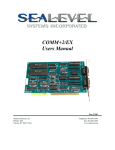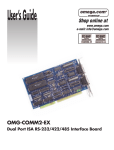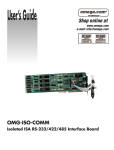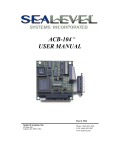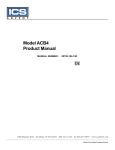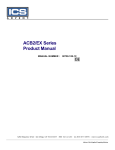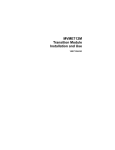Download Black Box IC110C User's Manual
Transcript
MARCH 2000 IC110C IC174C Dual Port RS-232 Serial Interface CUSTOMER SUPPORT INFORMATION Order toll-free in the U.S. 24 hours, 7 A.M. Monday to midnight Friday: 877-877-BBOX FREE technical support, 24 hours a day, 7 days a week: Call 724-746-5500 or fax 724-746-0746 Mail order: Black Box Corporation, 1000 Park Drive, Lawrence, PA 15055-1018 Web site: www.blackbox.com • E-mail: [email protected] DUAL PORT RS-232 SERIAL INTERFACE FEDERAL COMMUNICATIONS COMMISSION AND CANADIAN DEPARTMENT OF COMMUNICATIONS RADIO FREQUENCY INTERFERENCE STATEMENTS This equipment generates, uses, and can radiate radio frequency energy and if not installed and used properly, that is, in strict accordance with the manufacturer’s instructions, may cause interference to radio communication. It has been tested and found to comply with the limits for a Class A computing device in accordance with the specifications in Subpart J of Part 15 of FCC rules, which are designed to provide reasonable protection against such interference when the equipment is operated in a commercial environment. Operation of this equipment in a residential area is likely to cause interference, in which case the user at his own expense will be required to take whatever measures may be necessary to correct the interference. Changes or modifications not expressly approved by the party responsible for compliance could void the user’s authority to operate the equipment. This digital apparatus does not exceed the Class A limits for radio noise emission from digital apparatus set out in the Radio Interference Regulation of the Canadian Department of Communications. Le présent appareil numérique n’émet pas de bruits radioélectriques dépassant les limites applicables aux appareils numériques de la classe A prescrites dans le Règlement sur le brouillage radioélectrique publié par le ministère des Communications du Canada. TRADEMARKS USED IN THIS MANUAL AT and IBM are registered trademarks of International Business Machines Corporation. PC/XT and XT are trademarks of International Business Machines Corporation. DUAL PORT RS-232 SERIAL INTERFACE Contents Chapter Page 1. Specifications...................................................................................................1 2. Introduction ....................................................................................................2 2.1 Overview..................................................................................................2 2.2 What’s Included......................................................................................2 2.3 Features ...................................................................................................3 2.4 Technical Description ............................................................................4 3. Address Selection ............................................................................................6 4. Option Selection .............................................................................................8 5. Installation.....................................................................................................10 5.1 Installing the Adapter in Your Operating System ...............................10 5.1.1 Windows 3.1x...............................................................................10 5.1.2 Windows 95/98 ...........................................................................10 5.1.3 Windows NT ................................................................................10 5.2 Installing the Hardware ........................................................................10 Appendix: Cicuit-Board Design ........................................................................11 CHAPTER 1: Specifications 1. Specifications Protocol — Asynchronous Number of Ports — 2 Speed — IC110C: Up to 115.2 Kbps; IC174C: 460.8 kbps and higher Operation — RS-232 Connectors — (2) DB9M Maximum Distance — 50 ft. (15.2 m) @ 19.2 Kbps with 2500 pF max. cable capacitance (lower capacitance will allow greater distances) Communications Chip — IC110C: 16550 UART; IC174C: 16950 UART MTBF — >150,000 hours MTTR — <0.25 hours Materials — Boards are solder mask over bare copper or tin nickel Operating Temperature — 32° to 122°F (0° to 50°C) Storage Temperature — -4° to 158°F (-20° to 70°C) Humidity — 0 to 90% relative humidity, noncondensing Power — +5 VDC @ 270 mA ±12 V @ 50 mA Size — 5"W x 5"D (12.7 x 12.7 cm) Weight — 0.2 lb. (0.1 kg) 1 DUAL PORT RS-232 SERIAL INTERFACE 2. Introduction 2.1 Overview The Dual Port RS-232 Serial Interface provides your PC system with two RS232 asynchronous ports. Connect to any device that uses the RS-232 protocol, such as modems, data-entry terminals, and plotters. The Serial Interface also includes a serial utility diskette with Seacom, a DOS interrupt and driver package. Seacom allows data to be buffered, eliminating data loss in high-speed data transfers. It also allows more than 4 ports (256 max.) to be configured and utilized under DOS. The README file on the serial utility diskette contains information about the latest changes and revisions. To view this file, insert the diskette into drive A or B and type A:TYPE READ.ME|MORE [ENTER] or B:TYPE READ.ME|MORE [ENTER]. 2.2 What’s Included Your Serial Interface should come with the following items. If any of these items are missing or damaged, contact your supplier. (1) Dual Port RS-232 Serial Interface, (2) serial utility software diskettes: (1) for 32-bit Windows®, (1) for DOS and Windows®3.1x This manual 2 CHAPTER 2: Introduction 2.3 Features Listed below are the special features your Serial Interface offers. • Each port is independently addressable. • Eight interrupt options, including AT interrupts, for simple integration into existing systems. • IRQs can be shared or individually set for each port. • Supports Interrupt Sharing—only one interrupt line required for multiple ports. • Supports any character set defined by binary notation. • 16550 UARTs (IC110C) or 16950 UARTs (IC174C) help ensure against data loss. • Faster baud rates—up to 115.2 Kbps (IC110C) or 460.8 kbps and higher (IC174C). • Dual DB9 male AT® style connectors. • Individually selectable address and interrupt (2–5 and 10, 11, 12, or 15 on the AT connector) for each port. 3 DUAL PORT RS-232 SERIAL INTERFACE 2.4 Technical Description The Dual Port RS-232 Serial Interface provides the PC/XT™/AT/80X86 computer with two additional serial ports for terminals, modems, printers, etc. The Dual Port RS-232 Serial Interface can be configured as COM1: through COM4:, or any other I/O address. The Dual Port RS-232 Serial Interface (IC110C) utilizes the same 16550 UART chip found in the IBM® asynchronous adapter. This chip features programmable baud rate, data format, and interrupt control. Refer to the IBM Technical Reference for details on programming the chip. The IC174C uses the 16950 UART chip. Each serial port can be set as COM1:, COM2:, or any other I/O address set up to 3FF hex, providing total compatibility with most communications software and languages. Some software packages require the use of the modem handshake signals such as CTS or DCD. Consult your software manual to determine handshake-signal requirements. If no requirements are mentioned, or if you are not sure, a safe configuration is to connect (in your cable hood) DTR to DSR and DCD, and tie RTS to CTS. This usually satisfies the modem signal requirements for most communications software. The table on page 5 shows the connector pinouts for ports J1 and J2 (DB9). Note that this is the same RS-232 pinout as the DB9 serial AT connector. 4 CHAPTER 2: Introduction Pin Number Signal Name Mode 3 7 4 5 2 1 6 8 9 Transmit Data (TD) Request To Send (RTS) Data Term Ready (DTR) Ground (GND) Receive Data (RD) Data Carrier Detect (DCD) Data Set Ready (DSR) Clear To Send (CTS) Ring Indicator (RI) Output RS-232 Output RS-232 Output RS-232 –––––––––––– Input RS-232 Input RS-232 Input RS-232 Input RS-232 Input RS-232 5 DUAL PORT RS-232 SERIAL INTERFACE 3. Address Selection NOTE Be sure to set the address selections and jumper options before installation. Each serial port on the Dual Port RS-232 Serial Interface occupies 8 consecutive I/O locations. A DIP switch is used to set the base address for these locations. Be careful when selecting the base address as some selections conflict with existing PC ports. The following table shows several examples that usually do not cause a conflict. SW1 sets the I/O address for Port 2 (the upper connector), while SW2 sets the address for Port 1 (the lower connector). Address Hex 280-287 2A0-2A7 2E8-2EF 2F8-2FF 3E8-3EF 300-307 328-32F 3F8-3FF Binary A9 A0 1010000XXX 1010100XXX 1011101XXX 1011111XXX 1111101XXX 1100000XXX 1100101XXX 1111111XXX Switch Position Setting 1 OFF OFF OFF OFF OFF OFF OFF OFF 2 ON ON ON ON OFF OFF OFF OFF 3 OFF OFF OFF OFF OFF ON ON OFF 4 ON ON OFF OFF OFF ON ON OFF 5 ON OFF OFF OFF OFF ON OFF OFF 6 ON ON ON OFF ON ON ON OFF 7 ON ON OFF OFF OFF ON OFF OFF Typically COM1:=3F8h; COM2:=2F8h; COM3:=3E8h; COM4:=2E8h If you do not see an address in the table that is compatible with your software, 6 CHAPTER 3: Address Selection you can determine the switch setting for a particular address by using the following illustration. The illustration shows the correlation between the DIP switch setting and the address bits used to determine the base address. In the figure below, the address 300 hex through 307 hex is selected (300 HEX =11 0000 0XXX in binary representation). Note that setting the switch ON (or closed) corresponds to a “0” in the address, while leaving it OFF (or open) corresponds to a “1.” A9 A3 EN ON 1 2 3 4 5 6 7 8 7 DUAL PORT RS-232 SERIAL INTERFACE 4. Option Selection NOTE Be sure to set the address selections and jumper options before installation. The board contains several jumper straps for each port which must be set for proper operation. Port Enable/Disable Each port on the Dual Port RS-232 can be enabled or disabled with switch position 8 on the DIP switch. The port is enabled with the switch ON (or closed) and disabled when OFF (or open). Switch 2 (SW2), position 8 enables/disables Port 1, while Switch 1 (SW1), position 8 enables/disables port 2. If either port is disabled, be sure to also disable the interrupt request for that port by removing the IRQ jumper (see Figure 4-1). Setting the Interrupt Request Headers E1 and E2 select the interrupt request for each serial port. If COM1: is selected, this jumper must be on the IRQ4 setting. If COM2: is selected, this jumper must be on IRQ3. Both ports can be set to the same IRQ setting. If no interrupt is desired, remove the jumper. NOTE Most communications software applications default COM3: to IRQ4 and COM4: to IRQ3. This requires the sharing of interrupts between COM1: and COM3:, and between COM2: and COM4:. While this is the default, it is not always the best setting. Check your software configuration instructions to determine the most appropriate IRQ setting. 8 10 11 12 15 2 3 4 5 CHAPTER 4: Option Selection Figure 4-1. Header E1 and E2 (IRQ 4 selected). E4 M N E3 Headers E3 and E4 select the (normal) single-interrupt-per-board mode or the multi-interrupt mode, which allows you to share both interrupts on this card. The multi-interrupt mode also allows you to share the IRQ signal(s) with other cards that support multiple interrupts. Figure 4-2. Headers E3 and E4 in Normal Mode. 9 DUAL PORT RS-232 SERIAL INTERFACE 5. Installation IMPORTANT You MUST set up the operating system BEFORE you physically install the Card. 5.1 Installing the Adapter in Your Operating System If you are installing an ISA adapter in DOS, OS/2®, or QNX, please refer to the appropriate directory on one of the Serial Utilities Disks for instructions. 5.1.1 WINDOWS 3.1X Please refer to the /WINDOWS sub-directory on the Serial Utilities Diskette for help files and current information on the installation of the Card in this operating environment. 5.1.2 WINDOWS 95/98 For the ISA card, run setup the Serial Utilities Diskette before installing the card. Make note of the resources that Windows assigns the adapter and set the adapter to match those resources. Power down the computer and install the adapter. 5.1.3 WINDOWS NT For the ISA card, run setup on disk two of the Serial Utilities Diskettes before installing the card. After installing the software, refer to the help file that automatically comes up for installation instructions. 5.2 Installing the Hardware The Dual Port RS-232 can be installed in any of the PC expansion slots, except J8 on the original IBM XT™ and Portable. Follow these steps to install the card: 1. Remove the PC case. 2. Remove the blank metal slot cover. 3. Gently insert the board. 10 CHAPTER 5: Installation 4. Replace the screw. 5. Replace the cover. If you wish to change any resources assigned to the adapter, refer to the help file installed in the Black Box folder in the Start, Programs menu. Installation is complete. 11 DUAL PORT RS-232 SERIAL INTERFACE Appendix: Circuit-Board Design P2 C2 C1 C3 U2 SW1 U3 E1 E2 PORT1 PORT2 2 2 3 3 4 4 5 5 10 10 11 11 12 12 R1 15 15 U1 U4 C4 SW2 R2 P1 Y1 U5 U6 C6 C5 R3 M C7 N 1 1 U10 U9 E3 E4 U7 C8 1 14 12 J1 1 6 D1 R4 D2 R5 U6 C9 J2 1 6 5 9 J4 13 25 5 9 1 6 5 9 J3 P2 P2 P2 P2 P1 P1 P1 P1 P1 P1 P1 P1 P1 P1 P1 P1 P1 P1 P1 P1 P1 P1 D6 D5 D4 D3 B23 B24 B25 B4 A2 A3 A4 A5 A6 A7 A8 A9 B14 B13 A29 A30 A31 B2 A11 A28 A27 A26 A25 A24 6 7 5 3 1 SW1 SW1 SW1 SW1 SW1 11 10 12 14 16 IRQ15 IRQ12 IRQ11 IRQ10 IRQ5 IRQ4 IRQ3 IRQ2 D7 D6 D5 D4 D3 D2 D1 D0 RD/ WR/ A2 A1 A0 RESET GND 4 SW1 13 PORT 1 2 SW1 15 AEN A3 A4 A5 A6 A7 A8 A9 A8 A6 A4 AEN A3 A5 A7 A9 BRD/ GND GND GND 3 4 5 6 7 8 9 2 1 19 11 13 15 17 19 2 4 6 8 1 3 5 7 9 12 14 16 18 2 4 6 8 11 13 15 17 VSS P>Q P=Q VDO U5 Y1 Y2 Y3 Y4 Y1 Y2 Y3 Y4 10 18 16 14 12 20 9 7 5 3 B2 B3 B4 B5 B6 B7 B8 2 4 6 8 10 12 14 16 2 4 6 8 10 12 14 16 E1 E2 74LS245 A2 A3 A4 A5 A6 A7 A8 1 3 5 7 9 11 13 15 1 3 5 7 9 11 13 15 1 17 16 15 14 13 12 11 8 1 R1 2 2 16 14 12 10 11 13 15 9 2 E3 E4 1 3 DB1 DB2 DB3 DB4 DB5 DB6 DB7 DB0 1 3 2 4 6 7 5 3 1 SW2 SW2 SW2 SW2 SW2 SW2 SW2 GND GND 1 1 PORT 2 BWR/ BRD/ BRESET BA0 BA1 BA2 GND SW1 +5V GND GND +5V GND +5V 10 19 20 20 G VDO 10 DIR VSS 18 A1 B1 U6 74LS244 A1 A2 A3 A4 VDO/VSS G A1 A2 A3 A4 VDO/VSS G 74LS244 U5 74LS682 Q0 Q1 Q2 Q3 Q4 Q5 Q6 Q7 P0 P1 P2 P3 P4 P5 P6 P7 U1 1 A23 D1 2 2 A8 A6 A4 AEN A3 A5 A7 A9 +5V D2 R3 2 1 5 6 74LS125A 11 U7 12 13 9 8 74LS125A 10 U7 74LS125A 4 U7 +5V 10 1 GND GND 19 8 SW2 20 GND VSS P>Q P=Q VDO 74LS682 Q0 Q1 Q2 Q3 Q4 Q5 Q6 Q7 P0 P1 P2 P3 P4 P5 P6 P7 74LS125A 3 U7 3 5 7 9 GND 12 14 16 18 2 4 6 8 11 13 15 17 U4 P1 P1 P1 P1 P1 P1 9 B31 B1 B29 B3 B7 B9 +5V 1 R2 +5V GND GND GND GND + TD1 1 2 3 4 5 6 7 8 33 32 34 31 24 23 15 30 11 40 20 1 2 3 4 5 6 7 8 33 32 34 31 24 23 15 30 11 40 20 7 1 -12V 8250A VDO XTAL1 VSS XTAL2 MR D0 CS0 D1 CS1 D2 CS2 D3 DISTR D4 DISTR D5 DOSTR D6 DOSTR D7 ADS DTR RCLK RTS SIN CTS OUT1 DSR OUT2 CSOUT DCD RI DDIS BAUDOUTA0 A1 INTRPT A2 SOUT U3 8250A XTAL1 XTAL2 MR D0 CS0 D1 CS1 D2 CS2 D3 DISTR D4 DISTR D5 DOSTR D6 DOSTR D7 ADS DTR RCLK RTS SIN CTS OUT1 DSR OUT2 CSOUT DCD RI DDIS BAUDOUTA0 A1 INTRPT A2 SOUT VDO VSS U2 TXCO OUT VDO Y1 VSS NC 16 17 35 12 13 14 22 21 19 18 25 9 10 36 37 38 39 28 27 26 16 17 35 12 13 14 22 21 19 18 25 9 10 36 37 38 39 28 27 26 +12V 8 14 GND DTR1 VSS VEE- 9 +5V MC145406 2 2 3 2 3 2 3 2 3 2 3 2 3 2 3 2 3 8 7 DTR1/ DTR1/ 6 11 10 DSR1/ RTS1/ RTS1/ CTS1/ CTS1/ TD1/ TD1/ RD1/ RD1/ RI1/ RI1/ DCD1/ DCD1/ RI2/ RI2/ DCD2/ DCD2/ DTR2/ DTR2/ DSR2/ DSR2/ RTS2/ RTS2/ CTS2/ CTS2/ TD2/ DSR1/ -12V +12V GND +12V -12V +12V TD2/ RD2/ RD2/ 5 12 4 13 RTS1 3 14 BWR/ 1 2 TD1 VDO VEE+ U10 MC1489 15 16 6 V+ ENA OUTA INA ENB OUTB INB 8 ENC OUTC INC 11 END OUTD IND GND 3 U9 14 2 1 5 4 9 10 12 13 7 8 9 MC145406 7 6 10 11 4 3 2 1 5 VSS VEE- VDO VEE+ U8 12 13 14 15 16 BRD/ RD1 CTS1 DSR1 DCD1 RI1 BA0 BA1 BA2 GND +5V +5V GND BWR/ RD2 CTS2 DSR2 DCD2 RI2 BA0 BA1 BA2 DTR2 RTS2 TD2 +5V BRD/ BRESET BRESET GND +5V +5V 1 C9 1 C6 1 C1 1 C2 1 C3 1 C4 1 1 1 C5 C7 DTR1 RTS1 +5V GND TD2 DTR2 RTS2 C8 +5V +5V -12V +12 DB0 DB1 DB2 DB3 DB4 DB5 DB6 DB7 DB0 DB1 DB2 DB3 DB4 DB5 DB6 DB7 2 A22 R5 R4 2 1 2 1 2 P1 P1 P1 P1 P1 P1 P1 P1 4 4 6 6 7 7 8 8 3 3 2 2 9 9 1 1 22 9 8 1 20 4 6 6 4 7 5 8 2 3 3 2 J2 J3 J2 J3 J2 J3 J2 J3 J2 J3 J2 J3 J1 J4 J1 J4 J2 J3 J2 J3 J1 J4 J1 J4 J1 J4 J1 J4 J1 J4 J1 J4 APPENDIX: Circuit-Board Design 13 © Copyright 2000. Black Box Corporation. All rights reserved. 1000 Park Drive • Lawrence, PA 15055-1018 • 724-746-5500 • Fax 724-746-0746




















